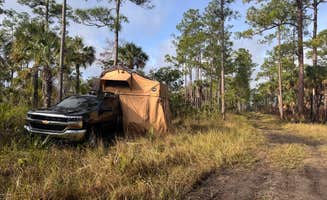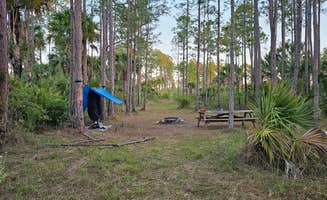Dispersed camping near Clewiston, Florida centers around the wetland ecosystems of the Florida Everglades and Big Cypress National Preserve. These areas feature subtropical terrain with an average elevation near sea level and seasonal water level fluctuations that affect trail conditions. Winter camping (November through April) offers drier conditions and fewer insects than the hot, humid summer months when thunderstorms frequently occur.
What to do
Bird watching opportunities: The wetlands surrounding primitive campsites provide excellent bird watching, particularly during migration seasons. Panther Camp offers a strategic location with "a tree grove with a picnic table and firepit" that serves as a good base for wildlife observation.
Night sky viewing: The remote locations of these primitive campsites offer minimal light pollution. At Nobles Primitive Camp, campers can experience "old Florida" conditions ideal for stargazing, as it's situated "next to marsh land" with minimal development nearby.
Water filtration practice: For experienced backcountry campers, these sites offer opportunities to practice survival skills. Remember that water sources may contain wildlife. As one camper noted about Panther Camp, there's "a water hole in the back of the camp which can be filtered," though they recommend bringing your own water instead.
What campers like
Complete isolation: Many visitors value the total disconnection from developed areas. Lucky Hammock and similar sites provide genuine wilderness experiences, though campers should prepare for wildlife encounters as the area "is infested with feral pigs, so don't plan on sleeping at night."
Free camping: All the dispersed camping options near Clewiston come without fees. Panther Camp is described as a "great spot to disconnect. Primitive. Free." with "no cost to stay, no reservations needed."
Authentic wilderness: The backcountry camping experience in Big Cypress National Preserve offers genuine Florida ecosystems. Nobles Primitive Camp provides a "great remote drive out to the primitive site" with true wilderness character, accessible via roads that "turn to dirt/gravel" with "one way in one way out."
What you should know
Permit requirements: Most sites within Big Cypress National Preserve require permits. For Carpenter Primitive Camp, permits are mandatory, though some campers report varied enforcement levels at other locations.
Road and trail conditions: Access roads and trails may flood seasonally. For Nobles Primitive Camp, "the access road was drivable with two wheel drive" during drier periods, but conditions vary throughout the year.
Limited facilities: No drinking water, toilets, or trash service exists at any of these sites. Campers must pack in all supplies and pack out all waste.
Wildlife awareness: Alligators, snakes, and feral pigs are common in the area. Secure food properly and maintain awareness of surroundings at all times.
Tips for camping with families
Water planning: Calculate at least 1 gallon per person per day, with extra for cooking and cleaning. No potable water exists at these sites, and natural water sources may not be safe without proper filtration.
Mud preparation: Trails to Ivy Primitive Camp and other sites can become extremely muddy. Pack extra footwear and waterproof bags for all family members.
Insect protection: The wetland environment supports large mosquito populations, particularly in warmer months. Bring appropriate clothing, netting, and EPA-approved insect repellents for all family members.
Emergency communications: Cell service varies throughout the preserve. Some areas like Panther Camp have "strong cell signal due to cell towers at the rest stop," but other locations may have no service.
Tips from RVers
Access limitations: These dispersed sites are not suitable for RVs or trailers. The primitive nature of access roads and camping areas accommodates tent and hammock camping only.
Alternative options: RVers should consider established campgrounds with hookups in the broader Clewiston region instead of these primitive dispersed sites.
Day-use consideration: RV travelers can park at designated trailheads and day-use areas, then backpack into these primitive sites for overnight stays while leaving their vehicles in designated parking areas.



